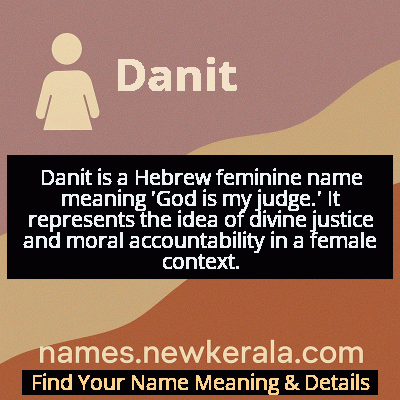Danit Name Meaning & Details
Origin, Popularity, Numerology Analysis & Name Meaning of Danit
Discover the origin, meaning, and cultural significance of the name DANIT. Delve into its historical roots and explore the lasting impact it has had on communities and traditions.
Name
Danit
Gender
Female
Origin
Hebrew
Lucky Number
3
Meaning of the Name - Danit
Danit is a Hebrew feminine name meaning 'God is my judge.' It represents the idea of divine justice and moral accountability in a female context.
Danit - Complete Numerology Analysis
Your Numerology Number
Based on Pythagorean Numerology System
Ruling Planet
Jupiter
Positive Nature
Optimistic, inspirational, and creative.
Negative Traits
Scattered, exaggerating.
Lucky Colours
Yellow, gold, purple.
Lucky Days
Thursday.
Lucky Stones
Yellow sapphire.
Harmony Numbers
1, 2, 9.
Best Suited Professions
Arts, writing, communication.
What People Like About You
Creativity, optimism.
Famous People Named Danit
Danit Greenberg
Israeli artist
Renowned contemporary painter known for her abstract works exploring Jewish identity
Danit Peleg
Fashion designer
Pioneer in 3D-printed fashion who created the first entirely 3D-printed clothing collection
Danit Trabelsi
Journalist
Prominent Israeli journalist and news anchor for major Israeli broadcasting networks
Danit Lidor
Actress
Israeli theater and television actress known for her roles in popular Israeli dramas
Name Variations & International Equivalents
Click on blue names to explore their detailed meanings. Gray names with will be available soon.
Cultural & Historical Significance
The name Danit specifically embodies the Israeli cultural values of strength, independence, and moral integrity. As Israel established itself as a nation, names like Danit helped create a distinct Israeli identity separate from the diaspora experience. The name carries the weight of Jewish history while pointing toward a future where women play active roles in all aspects of society. In contemporary Israeli culture, Danit represents the successful integration of ancient tradition with modern life, serving as a reminder that Jewish identity continues to evolve while maintaining its core spiritual values.
Extended Personality Analysis
Women named Danit are typically characterized by their strong sense of justice and moral clarity. The name's meaning 'God is my judge' often manifests in personality traits centered around integrity, fairness, and the courage to stand by one's convictions. Danits tend to be natural leaders who inspire confidence through their consistent ethical behavior and ability to make difficult decisions with compassion and wisdom. They often possess a quiet strength that others find reassuring, combined with sharp analytical skills that help them assess situations accurately.
Beyond their principled nature, Danits frequently exhibit a blend of traditional values and modern thinking. They respect heritage and history while being open to new ideas and progressive approaches. This balance makes them effective mediators and problem-solvers in both personal and professional contexts. Many Danits display remarkable emotional intelligence, understanding when to be firm and when to show mercy. Their judgment is typically tempered with empathy, creating individuals who are both respected for their principles and valued for their understanding nature. The name seems to attract or shape women who become pillars of their communities, known for their reliability and moral compass.
Modern Usage & Popularity
In modern times, Danit remains predominantly an Israeli name with steady but moderate usage. It peaked in popularity during the 1970s and 1980s in Israel but continues to be chosen by parents who want a Hebrew name that feels both traditional and contemporary. The name is particularly popular among secular and traditional Jewish families in Israel who appreciate its modern sound and biblical roots without being overtly religious. Internationally, Danit has gained some presence in Jewish communities worldwide, especially in North America and Europe, where it appeals to parents seeking authentic Hebrew names that work well in multicultural environments. While not among the most popular names statistically, Danit maintains a consistent presence due to its strong cultural resonance and the growing interest in Hebrew names outside Israel. The name's usage reflects broader trends toward cultural preservation and the global spread of Israeli culture.
Symbolic & Spiritual Meanings
Symbolically, Danit represents the concept of divine justice tempered with human compassion. The name embodies the idea that true judgment comes from aligning one's actions with higher principles while maintaining empathy and understanding. It symbolizes moral autonomy—the strength to follow one's conscience rather than conforming to external pressures. The feminine form of the name adds dimensions of nurturing wisdom and intuitive understanding to the concept of judgment, transforming it from cold assessment to compassionate discernment. Danit also carries symbolic weight as a bridge between ancient tradition and modern identity, representing the evolution of Jewish culture while maintaining spiritual continuity. The name suggests that true power lies not in dominating others but in living with integrity and being accountable to one's deepest values.

